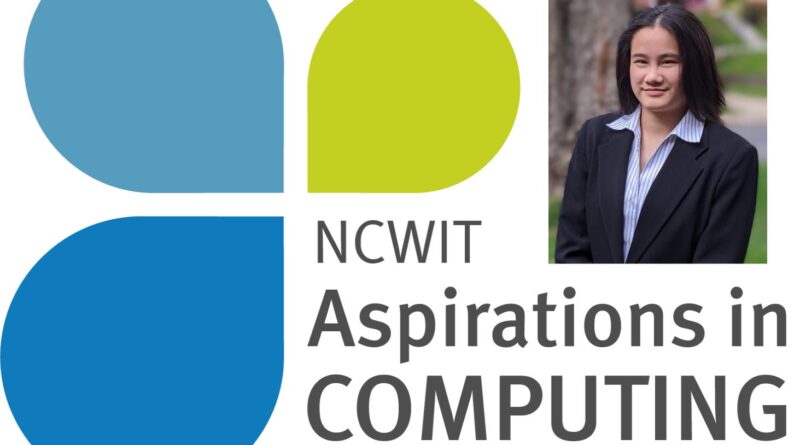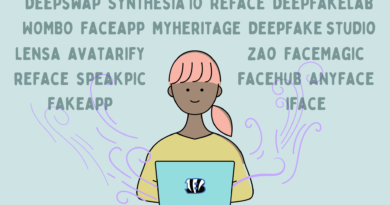Senior Wins Prestigious Technology Award, Hopes to Show Women Can Succeed in STEM
This year’s Regional Affiliate winner for the National Center for Women and Information Technology (NCWIT) Aspirations in Computing (AiC) Award is senior, Girls Who Code president and website manager Maxine Hsu.
“I’m glad that I’m being acknowledged for the work I’ve been doing in relation to computer science,” Hsu says. “And I think that it’s really great that there [are] all these organizations and awards and scholarship money for things that recognize women who are succeeding in tech.”
Upon the recommendation of Programming and AP Java teacher Mary Simms, Hsu applied for the award in 2019 and received an honorable mention. After attending more hackathons (a series of coding challenges) and augmenting her portfolio with a Girls Who Code summer camp, Hsu applied for the award again in 2020 and was named a Regional Affiliate winner.
Mrs. Simms does not suggest applying for this award to just any female student: Hsu stood out to Mrs. Simms because of her interest in computers and programming, as well as her leadership, willingness to help others and take risks. Knowing Hsu is interested in pursuing software development in college and beyond, Mrs. Simms thought the scholarship portion of the award would be within her grasp and beneficial as she gears up for higher education.
“She is willing to go out and explore all different aspects of computers in terms of the programming pieces,” Mrs. Simms says. “She wants to help others. If someone was struggling in AP [Java] and I asked her to help, she would help. Last year, she would teach lessons on HTML to Girls Who Code. She’s learned so many languages, her programming skills have jumped leaps and bounds, and [she] is willing to take risks.”
Venturing into the world of computer science itself can be risky as a woman given that computer science is still a largely male-dominated field, but Hsu shares that she never felt as though computer science was off limits to her. “I don’t think I ever looked at [computer science] that way because my mom is in computer science,” Hsu says. “For me, my mom is a strong woman that I know so I just thought if she can do anything, then that means I can do it as well.”
However, Hsu does feel hesitant about having to compete with males in the future. “I do think there will definitely be a large majority of people that I’ll be competing with, especially in regards to jobs,” Hsu adds. “Women’s voices might be sort of pushed to the side and disregarded because we’re a minority. Also, if I’m taking computer science courses at college, there will definitely be a lot more men than women.”
Hsu is optimistic about gender dynamics in the computer science field improving, though. “I think the [gender disparity] might improve, given how elite organizations are pushing forward in closing the gender gap,” she says.
What attracts Hsu to the broad field of computer science are the limitless possibilities one has at their disposal when they know how to code. “The thing I enjoy most about computer science is being able to create things,” Hsu says. “I remember the first time I wrote a line of code in Computer Programming 1 in my sophomore year of high school. I pressed compile and something spat out of the computer. And I thought that was really cool.”
From there, Hsu’s wonderment really took flight. “As I began building bigger and bigger projects, I was so amazed at how something as simple as basically broken English on your computer screen can create something that’s really complex. It can calculate complex mathematical equations, it can display graphics, it can do all sorts of things.” As Hsu points out, so many facets of our modern lives run on computer code.
Part of the reason Hsu wants to pursue computer science in college is to harness the power of computer code. “Code is essentially just really basic … and so that means that I can basically create anything I want so long as I’m continuing my education,” Hsu adds. “Computer programming specifically just builds off of the idea [of] broken English on a screen. Obviously, it gets more complicated than that, but even at the higher levels, that’s still the same. It’s just the syntax of the code.”
Hsu hopes to obtain at least a master’s degree in computer science and wishes to apply her knowledge to software engineering so she can develop apps in Silicon Valley or technology for the government. She also hopes to continue inspiring girls to get involved in computer science in college and beyond.
Hsu wishes more girls were open to exploring all that computer science has to offer. “Just don’t be afraid, because or just try to open your mind to things,” she advises. “When I was restarting the Girls Who Code club, I was going out and talking to people to see if they wanted to join. I remember I came across someone who was like, ‘Why is code important?’ And I was struck by how that statement sounded because I know a lot about what code does in our world and it was a girl who was asking that question. I just thought it was a shame how many people, maybe even specifically girls, aren’t exposed to these sorts of things early on. If code seems like something that only boys do, it’s not; anyone can do it, and you can do it too.”
Mrs. Simms expresses confidence in Hsu’s prospects in the far-reaching field of computer science. “Maxine is going to accomplish many great things if she just sets her mind to it—no matter … if it’s AI, gaming, coding, or taking computer programming to a different subject, she’s going to do great things with it,” Mrs. Simms adds. “She’s going to be successful in anything.”


